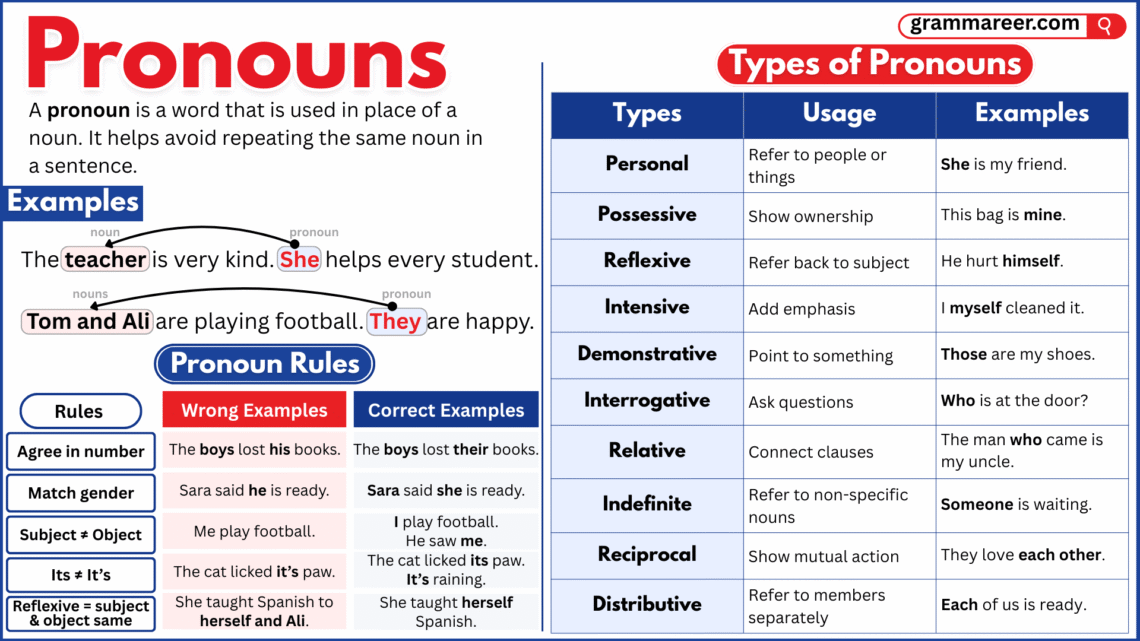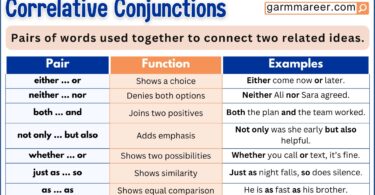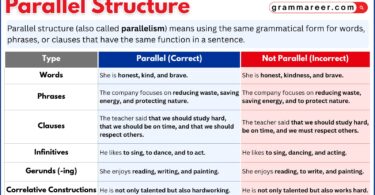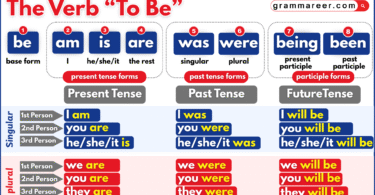Have you ever stopped to think about how often you use words like I, you, he, she, or they? These small but powerful words are called pronouns, and they save us from repeating the same nouns over and over again. Instead of saying “Sara loves Sara’s cat,” we simply say “Sara loves her cat.” Much easier, right? Pronouns make our sentences smoother, clearer, and more natural to read or say.
In this article, we’ll explore what pronouns are, their types, and some simple examples.
Table of Contents
What is a Pronoun?
A pronouns are words that we use instead of a noun. It helps us avoid repeating the same name again and again.
Examples:
- Sara has a book. She likes it.
- Ali is my friend. He is very kind.
- This is my pen. It writes smoothly.
- We are going to the park.
- They are playing football in the ground.
Pronouns are commonly classified into three groups by person.
| Person | Singular Pronoun | Plural Pronoun |
| First Person Pronoun | I, Me | We, Us |
| Second Person Pronoun | You, Your | You |
| Third Person Pronoun | He, She, It, Him, Her | They, Them, Their |
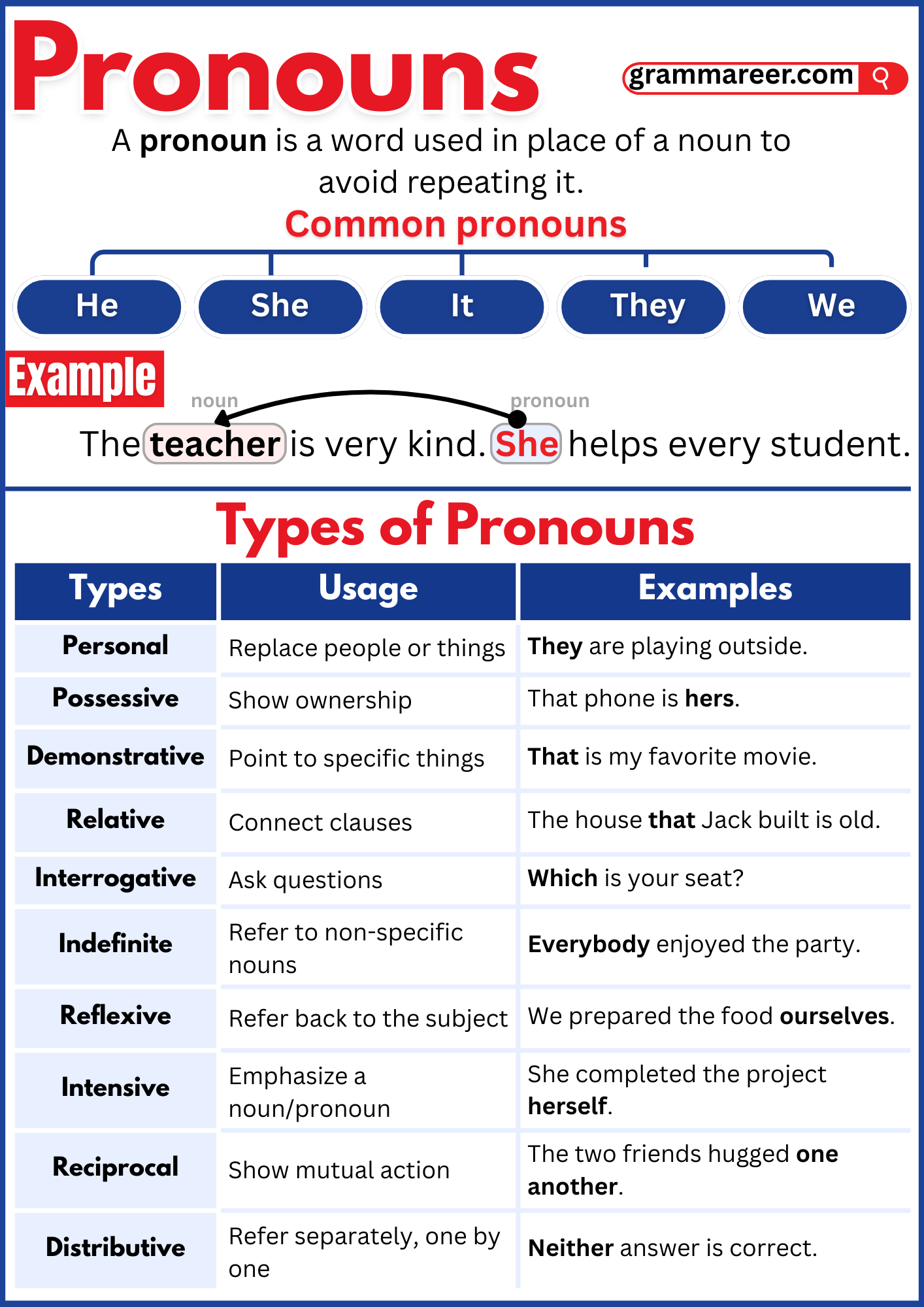
What is an Antecedent?
Before we can use a pronoun, we usually have to mention the noun it refers to. That noun is called the antecedent.
Think of it this way: a pronoun is like a nickname, and an antecedent is the real name. First you introduce the real name, then you can use the nickname.
Examples:
- Ali has a bike. He rides it every day.
- The book is on the table. Can you pass it to me?
- My friends are kind. I enjoy spending time with them.
Here, the underlined nouns (Ali, book, my friends) are the antecedents, and the bold words (he, it, them) are the pronouns.
Sometimes, you don’t need an antecedent. Words like I, you, we, and me are clear on their own because everyone already knows who they refer to.
So, in short: an antecedent is simply the noun that a pronoun replaces.
How Are Pronouns Used in a Sentence?
The main job of a pronoun is to take the place of a noun. Because of this, pronouns are used in sentences just like nouns.
Pronouns as subjects
Most of the time, pronouns act as the subject of a sentence. That means they come before the verb.
Examples(Pronouns as subjects):
- I love reading books.
- We are going to the market.
- It looks like it might rain.
Pronouns as objects
Pronouns can also be used as the object in a sentence. The object is the person or thing that the action happens to.
Examples(Pronouns as objects):
- Can you help me?
- She called him yesterday.
- The teacher gave us homework.
So, whether as a subject or an object, pronouns keep our sentences clear and natural without repeating the same nouns again and again.
Types of Pronouns
Types of pronouns show the different ways we use pronouns in sentences. Each type has its own role—sometimes replacing a noun, sometimes pointing to someone or something. Let’s break them down:
| Type | Explanation | Examples | In a Sentence |
| Personal Pronouns | Used to refer to people or things directly. | I, you, he, she, it, we, they | • I love reading. • They are my friends. |
| Possessive Pronouns | Show ownership. | mine, yours, his, hers, ours, theirs | • That book is mine. • This house is ours. |
| Reflexive Pronouns | Point back to the subject. | myself, yourself, himself, herself, itself, ourselves, themselves | • She taught herself Spanish. |
| Demonstrative Pronouns | Point to something specific. | this, that, these, those | • This is my bag. • Those are old photos. |
| Relative Pronouns | Connect clauses and add info. | who, whom, which, that, whose | • The girl who won is my cousin. |
| Indefinite Pronouns | Refer to non-specific people/things. | someone, anyone, everyone, nobody, each, few, many | • Someone is at the door. • Many were absent. |
| Interrogative Pronouns | Used to ask questions. | who, whom, what, which, whose | • Who is your teacher? • Which is your bag? |
| Reciprocal Pronouns | Show mutual action/feeling. | each other, one another | • They respect each other. |
| Intensive Pronouns | Add emphasis to the subject. | myself, yourself, himself, herself, itself, ourselves, themselves | • I baked this cake myself. |
| Distributive Pronouns | Refer to members individually. | each, either, neither, none | • Each student got a book. • Neither answer is correct. |
Dummy Pronouns (Expletives)
Sometimes in English, we use pronouns that don’t really mean anything, but we still need them to make a sentence work. These are called dummy pronouns (or expletives).
The two main dummy pronouns are it and there.
They don’t replace a noun like normal pronouns do—they just fill in the subject spot so the sentence sounds complete.
We usually use them like:
- to talk about the weather
- to introduce something
- to emphasize part of a sentence
Examples:
- It is cold outside today.
- (We’re not talking about anything specific, we just need “it” there.)
- There is a book on the table.
- (The sentence needs “there” to sound natural.)
- It looks like we’re going to be late.
Pronouns vs Nouns
Nouns and pronouns both name people, places, things, or ideas—but they work a little differently.
- Nouns are more specific. They tell us exactly who or what we’re talking about. Example: Sara, book, city, happiness.
- Pronouns are more general. They take the place of nouns so we don’t repeat the same words. Example: she, it, they.
Look at this:
- Ali is my best friend. Ali loves cricket. (repeating “Ali”)
- Ali is my best friend. He loves cricket. (smoother with a pronoun)
Unlike pronouns, nouns don’t change their form depending on the role in a sentence. For example:
- Pronoun: he → him → his
- Noun: boy → boy → boy (stays the same)
Pronouns vs Determiners
Here’s where it can get a little tricky: some words look the same but act differently depending on their job.
- Pronouns can stand alone and replace a noun.
- Determiners come before a noun to describe or limit it.
Example:
- Pronoun: That is my bike.
- Determiner: That bike is mine.
So the difference is simple: pronouns do the job alone, while determiners help a noun.
Why are Pronouns Important?
We need pronouns because they make our sentences easier to say and understand. Without them, our speech and writing would feel long, repetitive, and a bit awkward. Pronouns keep things simple, natural, and clear.
FAQs
A pronoun is just a word we use instead of a noun so we don’t keep repeating the same word again and again.
We use pronouns to make our sentences smoother and less repetitive. Without them, our writing and speaking would sound clumsy.
There are different types, like personal pronouns, possessive pronouns, reflexive pronouns, demonstrative pronouns, and more. Each type has its own job in a sentence.
Yes, very! They help us talk more clearly and naturally. Imagine saying someone’s name again and again—it would sound odd. Pronouns make language easier.
Absolutely. The form of a pronoun can change depending on whether it’s the subject, object, or showing possession.
You May Also Like

